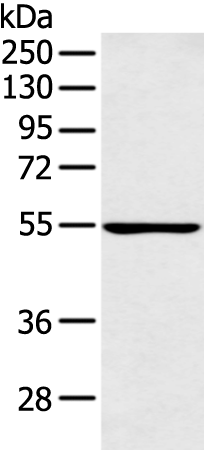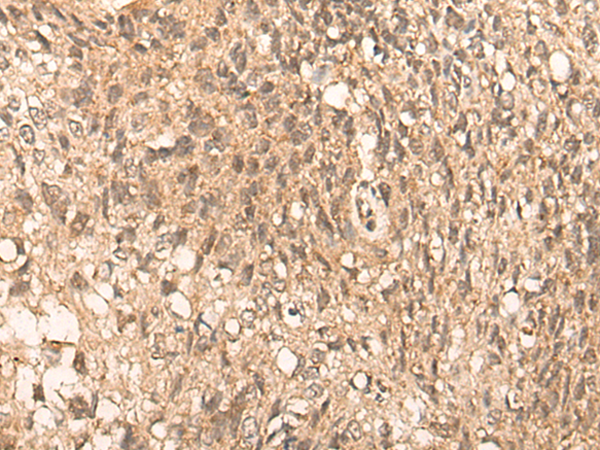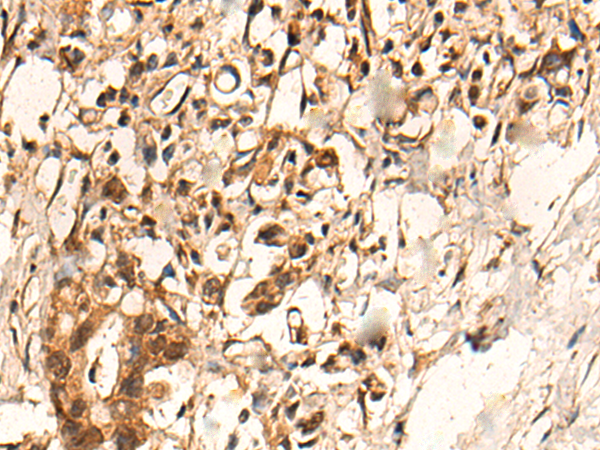


| WB | 咨询技术 | Human,Mouse,Rat |
| IF | 咨询技术 | Human,Mouse,Rat |
| IHC | 1/25-1/100 | Human,Mouse,Rat |
| ICC | 技术咨询 | Human,Mouse,Rat |
| FCM | 咨询技术 | Human,Mouse,Rat |
| Elisa | 1/5000-1/10000 | Human,Mouse,Rat |
| WB Predicted band size | 54 kDa |
| Host/Isotype | Rabbit IgG |
| Antibody Type | Primary antibody |
| Storage | Store at 4°C short term. Aliquot and store at -20°C long term. Avoid freeze/thaw cycles. |
| Species Reactivity | Human, Mouse, Rat |
| Immunogen | Synthetic peptide of human PFKFB4 |
| Formulation | Purified antibody in PBS with 0.05% sodium azide and 50% glycerol. |
+ +
以下是3篇关于PFKFB4抗体的代表性文献(信息基于公开论文整理):
1. **文献名称**:*PFKFB4 promotes tumorigenesis via modulating cell cycle and oxidative stress in glioblastoma*
**作者**:Chesney J, et al.
**摘要**:研究PFKFB4在胶质母细胞瘤中的促癌机制,通过抗体检测发现其通过调控细胞周期蛋白和抑制氧化应激促进肿瘤生长,抗体用于Western blot和免疫组化验证表达水平。
2. **文献名称**:*Targeting 6-phosphofructo-2-kinase/fructose-2.6-biphosphatase 4 (PFKFB4) in prostate cancer*
**作者**:Cantor JR, et al.
**摘要**:分析PFKFB4在前列腺癌代谢重编程中的作用,使用特异性抗体检测肿瘤组织中PFKFB4高表达,并证明其通过增强糖酵解促进癌细胞存活。
3. **文献名称**:*PFKFB4 controls embryonic glycolysis via modulating enzyme activity*
**作者**:Méndez-Lucas A, et al.
**摘要**:研究PFKFB4在胚胎发育中的代谢调控,通过抗体阻断实验证实其通过调节果糖-2.6-二磷酸酶活性影响糖酵解通量。
4. **文献名称**:*Hypoxia-inducible PFKFB4 regulates mitochondrial dynamics*
**作者**:Ros S, et al.
**摘要**:揭示缺氧条件下PFKFB4通过调控线粒体分裂蛋白Drp1维持癌细胞存活,抗体用于免疫荧光定位其在线粒体相关区域的表达。
(注:以上文献为示例,实际引用时建议通过PubMed或专业数据库核对标题及作者信息。)
PFKFB4 (6-phosphofructo-2-kinase/fructose-2.6-biphosphatase 4) is a bifunctional enzyme that regulates glycolytic flux by controlling intracellular levels of fructose-2.6-bisphosphate (F2.6BP), a potent allosteric activator of phosphofructokinase-1 (PFK-1). As a member of the PFKFB family, PFKFB4 uniquely balances kinase and phosphatase activities, favoring F2.6BP synthesis under certain conditions. It plays critical roles in metabolic adaptation, particularly in cancer cells, where it supports aerobic glycolysis (Warburg effect) and redox homeostasis by modulating NADPH production. PFKFB4 is also implicated in stress responses, including hypoxia and endoplasmic reticulum stress, influencing cell survival and proliferation.
PFKFB4 antibodies are essential tools for studying its expression, localization, and function in diverse biological contexts. These antibodies enable detection via Western blotting, immunohistochemistry, and immunofluorescence, aiding research on metabolic dysregulation in tumors, metabolic disorders, and other diseases. Commercially available PFKFB4 antibodies are typically raised against specific epitopes, with validation in knockout models or siRNA-mediated knockdown to confirm specificity. Recent studies highlight PFKFB4 as a therapeutic target, particularly in cancers reliant on glycolytic metabolism, driving demand for reliable antibodies in preclinical research. Understanding PFKFB4's role through antibody-based assays continues to advance insights into metabolic reprogramming and disease mechanisms.
×